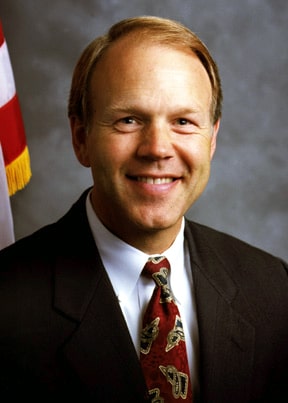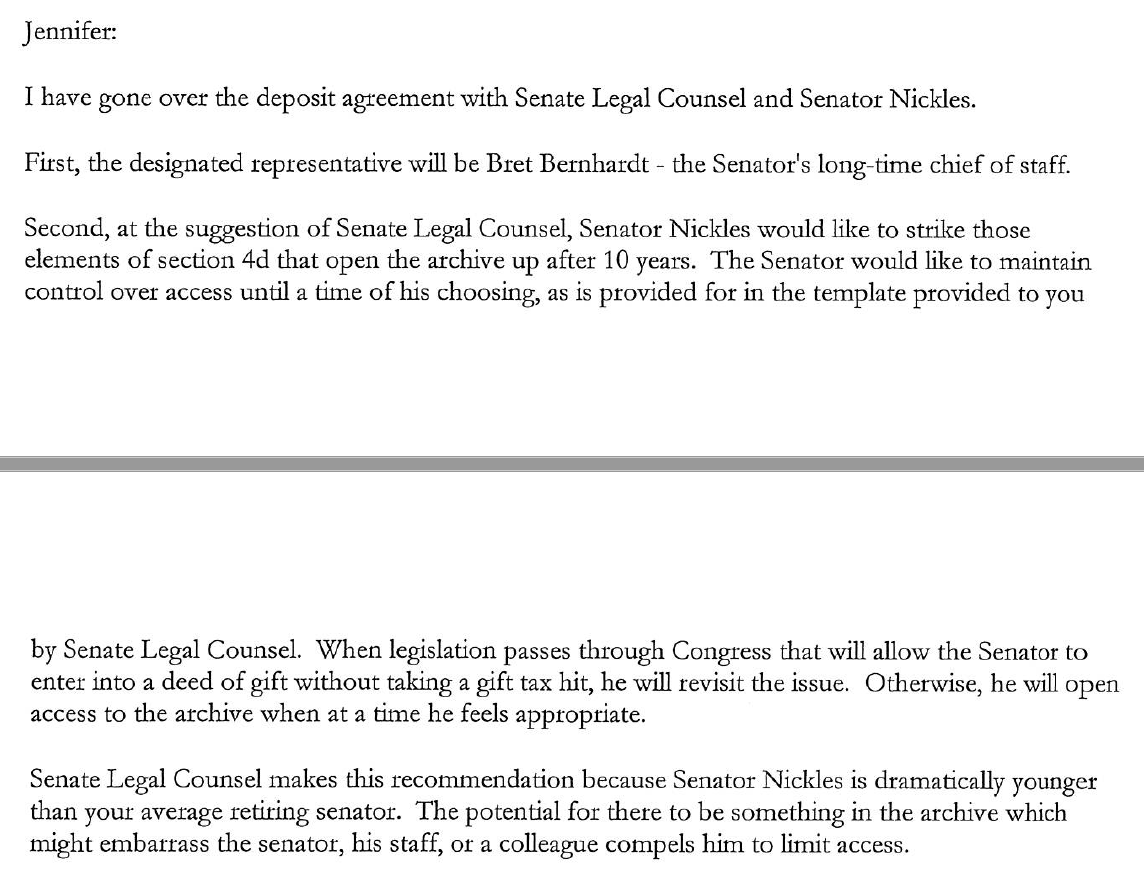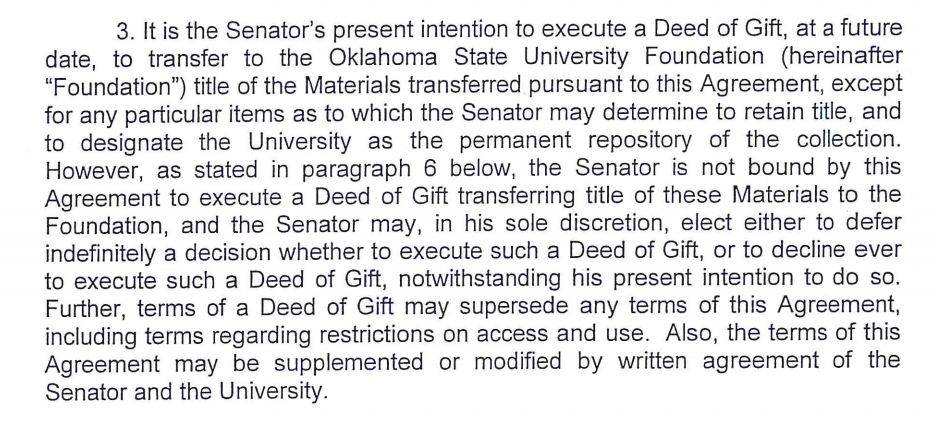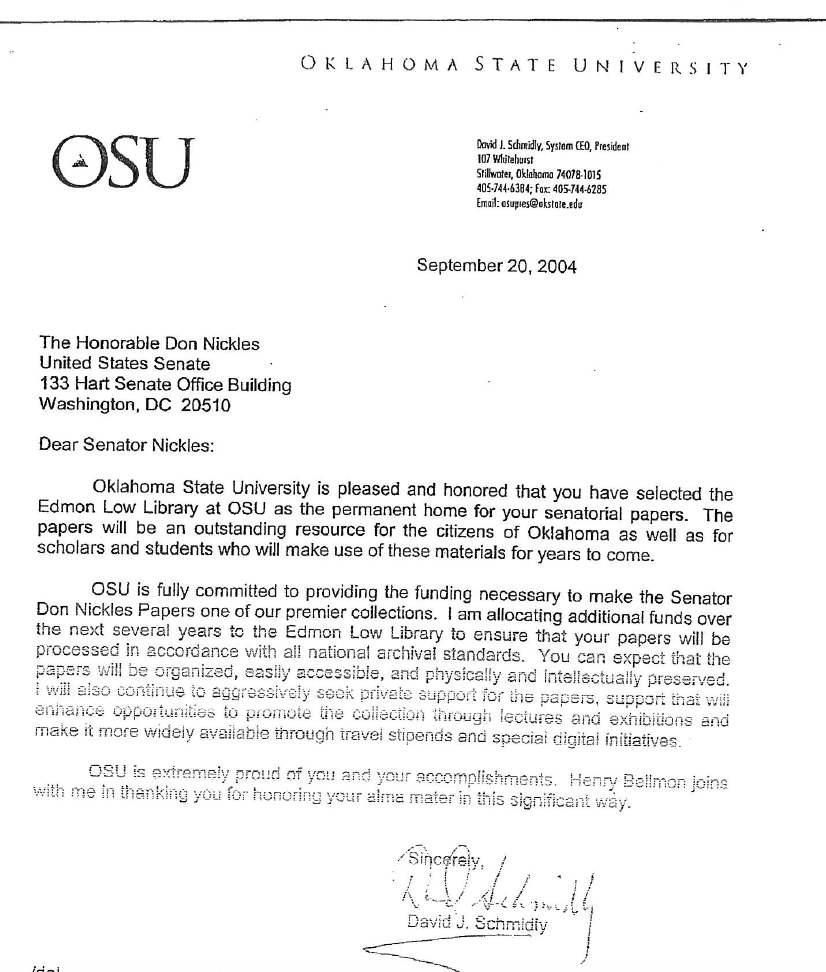Emails and documents obtained from Oklahoma State University (OSU) under the state’s open records law depict an arrangement in which former U.S. Sen. Don Nickles (R-OK) donated his U.S. Senate papers to OSU, a public university, but still maintains full control of the papers and who gets permission to view them.
A high-level staffer of Nickles at the time who was arranging the deposit of his records to OSU, GT Bynum — now running for Mayor of Tulsa, Oklahoma — wrote in a November 2004 email that a large part of the rationale for the set-up was “because Senator Nickles is dramatically younger than your average retiring senator” and there exists “potential for…something in the archive which might embarrass the senator, his staff, or a colleague.”
Nickles, now 67 and principal of the lobbying firm Nickles Group, currently lobbies for ExxonMobil, Anadarko Petroleum, Exelon and other companies. He formerly served on the Board of Directors of Chesapeake Energy and currently serves on that of Valero Energy.
This year alone, Nickles has lobbied for exports of gas obtained via hydraulic fracturing (“fracking”), expedited permitting for domestic oil and gas and other oil and gas-related policy issues on behalf of those three companies.
Image Credit: Oklahoma State University
According to a 964-page inventory list provided by OSU, Nickles’ Senate papers now warehoused at OSU‘s Edmon Low Library contain folder topics such as Interstate Oil and Gas Compact Commission (IOGCC) (this author’s original interest in the archives), the Resource Conservation and Recovery Act (RCRA), federal lands issues (which generally center around energy production) and numerous oil-, gas-, petroleum- and coal- and climate-related documents.
A previous DeSmog investigation revealed that Nickles played a vital role in securing the oil and gas industry’s exemption from U.S. Environmental Protection Agency (EPA) regulatory enforcement of RCRA as applied to the industry’s waste by-products. The RCRA loophole, the push for which was spearheaded by IOGCC, is now being challenged in federal court by the Environmental Integrity Project. The loophole can be tied directly to the proliferation of earthquakes caused by the waste by-products of fracking for oil and gas.
The public can view none of these historical records and perhaps learn more about these pieces of history through the lens of Nickles’ papers, though, without the written permission of Nickles.
“Exemptions Have Not Been Made”
Though stored at a public university, Nickles’ papers are not open for the public to view under any circumstance.
“While we have Senator Nickles Papers in storage they have not been turned over to us for access,” said David Peters of OSU‘s Edmon Low Library of the status of Nickles’ papers. “If you would like access to the papers you will need to contact Senator Nickles office requesting permission from him. He then sends us a letter authorizing your use. We will be happy to assist you once we hear from Senator Nickles.”
After learning of this arrangement, DeSmog contacted Nickles via his Nickles Group email address and received a response from his public relations assistant, Amy Lee of 133 Public Affairs. Nickles’ office denied DeSmog the opportunity to inspect his records.
In fact, Lee confirmed no one has ever been allowed to view the records.
“Exceptions have not been made to date and will not be made now,” Lee, who formerly worked for Nickles as a Senator, wrote in an email.
Exceptions are not made, it turns out, due to the contract signed between Nickles and OSU. The terms of that contract concerned some as it was being hashed out, the documents obtained by DeSmog reveal.
OSU also denied access to the records when requested under the state’s open records law, saying the contract it had signed with Nickles has an exemption which can be found within the statute.
The open records officer pointed to Section 24A.11 of the Open Records Act, titled “Confidential Library, Archive, or Museum Materials.” That clause permits public agencies to “keep confidential library, archive, or museum materials donated to the public body to the extent of any limitations imposed as a condition of the donation.”
The Contract
The terms of the Nickles papers contract sat at the center of the conversation between Nickles’ office and OSU.
It mostly came down to whether Nickles would give a deed of gift or would only sign off on a deposit agreement. Deeds of gift give most of the control over the archives to the institution receiving the gift, while deposits ensure full control by the depositor, in this case Nickles.
Nickles eventually chose to transmit his papers via a deposit agreement signed in December 2004 just as he left office and passed through the revolving door to become a lobbyist. His contract stated that he ultimately has the intention to make his papers a deed of gift — but he also is not contractually bound by that intention.
Image Credit: Oklahoma State University
The deposit agreement further allows for Nickles to reclaim his papers at any time from OSU until he dies, as opposed to the conventional ten-year time period, giving him de facto total control of the records stored at the public university. Nickles has yet to turn his deposit agreement into a deed of gift.
In an email, Jennifer Pastenbaugh, then an OSU librarian and now employed by Brigham Young University (BYU), expressed “alarm” over the terms of the contract as it was being hashed out. Pastenbaugh said a deposit — as opposed to a deed of gift — is something OSU had never done, making it “uncharted territory” for the school’s library.
Pastenbaugh had a call with Bynum days later in which she expressed her concerns and those of OSU, and she debriefed her colleagues on what the two of them discussed in a subsequent email. Bynum had conveyed to Pastenbaugh that Nickles’ desire for a deposit agreement and not a deed of gift centered around a then-pending piece of federal legislation (the bill number went unspecified in the emails) their office claimed they hoped would pass.
At the time, a bill called the CARE Act (S. 476) had been introduced by U.S. Sen. Charles Grassley (R-IA) and awaited House approval, which it never got. Oddly enough, Nickles voted down the legislation that never passed through the U.S. House of Representatives and was one of only five Senators to do so.
Section 110 of the bill titled, “Enhanced deduction for charitable contribution of literary, musical, artistic, and scholarly compositions,” called for tax benefits for those who give their artistic, musical, literary and scholarly materials to public collections. This would have included the papers of members of the U.S. Congress.
The contract also calls for Bret Bernhardt — former Nichols chief-of-staff and now executive vice president of the influential right-wing think-tank, Heritage Foundation — to serve as the “designated representative in the administration of this Agreement.”
Despite the terms of the deal being stacked in favor of Nickles, OSU promised from the get-go that the Senator would receive pristine handling of his papers.
Image Credit: Oklahoma State University
University of Oklahoma, the state’s flagship university, actually only does deeds of gift and not deposit agreements for its Carl Albert Congressional Research and Studies Center. Carl Albert maintains archives for the papers of dozens of former members of Congress.
“We require a deed of gift. That is pretty standard in archives across the country,” said Cindy Rosenthal, the director and curator of the Carl Albert Center. “The terms of a deed of gift may vary widely depending upon the donor. An archive is taking on a responsibility in perpetuity and therefore is making a long-term financial commitment to the care and maintenance of a collection.”
“It Can Breed Mistrust”
Unlike the president under the National Archives and Records Administration and the laws falling underneath its umbrella, members of Congress are not required to make their papers open to the public once they leave office and do so on a voluntary basis. Furthermore, unlike most executive branch agencies, their records are not subject to the Freedom of Information Act (FOIA).
Put another way, Congress has carved out a total exemption for itself with regards to its records serving as a primary source repository of history, closing them off to the public for review. Adding to the labyrinth, IOGCC also has claimed an exemption to state- and federal-level open records law.
The Society of American Archivists, the professional organization for U.S.-based historical archivists, writes in its “Guidelines for Access to Original Research Materials” that “The repository should discourage donors from imposing unreasonable restrictions and should encourage a specific time limitation on restrictions that are imposed.”
Bill Young, president of the FOI Oklahoma, also sees the dynamics in this particular case as problematic.
“Officials may be following the letter of state or federal law when they elect to restrict access to particular government information, but there is often a price to pay for that, because it makes the public question the integrity of their government, and it can breed mistrust.”
Photo Credit: Wikimedia Commons
Subscribe to our newsletter
Stay up to date with DeSmog news and alerts










